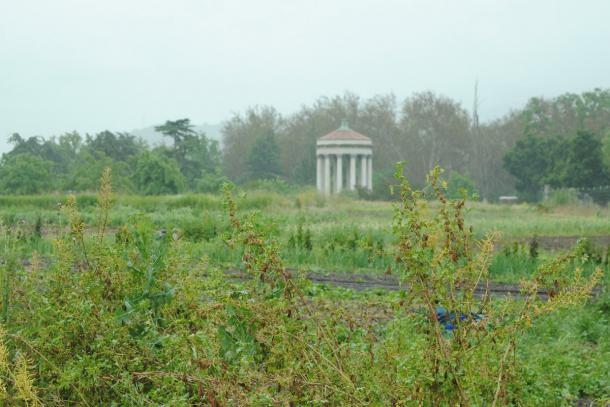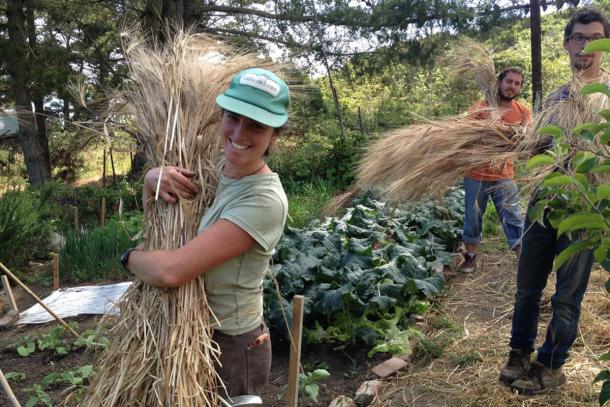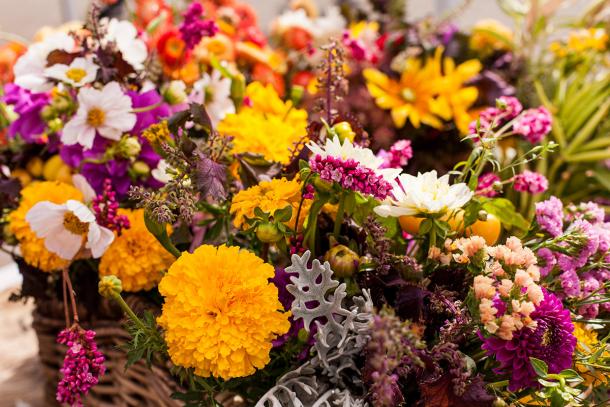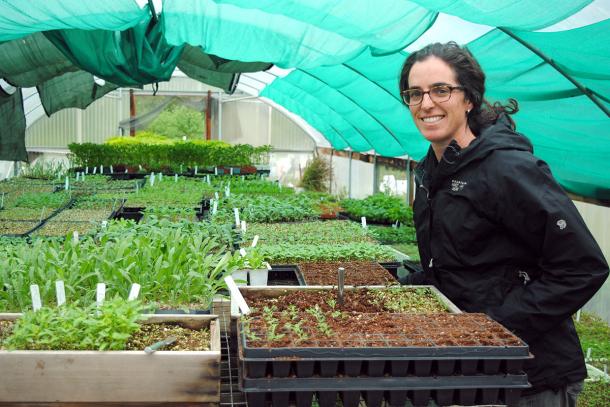In Bluma: Growing Organic Flowers at Sunol AgPark
Brie Mazurek, CUESA Staff
June 24, 2016

Some people are born into farming. But for Joanna Letz of Bluma Farm, it has been an unlikely path that unfolded through passion, perseverance, and some lucky breaks along the way.
Now in her second year of running an organic flower farm at Sunol AgPark, Joanna has joined the Ferry Plaza Farmers Market’s Saturday lineup. The 32-year-old is a youngster by most farmers’ standards, but with 10 years of experience under her belt, she’s no greenhorn.
Born and raised in Oakland, Joanna became interested in the environmental and social justice aspects of farming during a college study-abroad program, where she witnessed the impacts of globalization on small farmers. She decided that her best way to make a positive impact in the world was to start farming.
“Coming from an academic background, I just wanted to get my hands in the ground,” she says. “It made more sense to me than being in an office.”
The Road to Sunol

After college, she apprenticed with organic pioneer Amigo Bob Cantisano (“a huge mentor of mine”) at Heaven and Earth Farm, followed by stints at Green Gulch Farm, Slide Ranch, and the UCSC agroecology program.
“Doing farm apprenticeships requires a certain amount of economic stability and privilege,” Joanna admits. And while it took her non-farming parents a little while to adjust to their daughter’s agrarian inclinations, they have been hugely supportive. Her mother has even advised her in business planning.
Last year, Joanna began farming an acre and a half at Sunol AgPark, located between Pleasanton and Fremont. The AgPark has provided the perfect stepping stone to start her own farming enterprise while living in Oakland, close to family and friends.
A testing ground for new farmers, Sunol AgPark was developed by SAGE (Sustainable Agriculture Education) in 2006 on public land owned by the San Francisco Public Utilities Commission. In addition to leasing land, SAGE provides basic farming infrastructure and technical assistance for emerging farmers in need of their first break.
“We’re looking for farmers want to be farmers,” says Sibella Kraus, founder of SAGE (and the original founder of CUESA). “That’s the life they want to pursue, and being in the AgPark can help move them toward those long-term goals”
When vacancies become available, SAGE looks for farmers who have demonstrated experience, a realistic business plan, an ethos of sustainability, and a clear vision and niche. Joanna stood out because of her focus on organic flowers, still a relatively new market. “Joanna was just a fabulous mix,” says Sibella.
Farming in Community

Beginning farmers face many barriers, such as access to training, land, capital, and equipment. For those who have spent a few years learning the ropes through an apprenticeship or training program like ALBA or California Farm Academy, the AgPark program provides an opportunity to farm in community, allowing farmers to share resources and learn from one another while developing their fledgling businesses.
“We look for people who are community-minded, who valuethe chance to work collaboratively with other farmers,” says Sibella.
Sunol’s 2o acres of farmland are currently home to eight organic farms, including Namu Farm, Baia Nicchia (the AgPark’s longest tenant), and Feral Heart Farm, with which Bluma shares a greenhouse. Farmers help each other out, from sharing equipment to splitting up irrigation duties.
“It’s really fun being out there with those other farmers,” says Joanna. “A big reason I ended up at Sunol was because I knew Jim Leap would be there mentoring and offering tractor services,” says Joanna. “I wasn’t ready to buy land or a tractor. I wanted to see how my business grew before investing that amount of capital.”
Shortening the Flower Chain

From agrostemma to zinnias, Joanna grows over 60 varieties of organic flowers for market. Over the last year, she has focused on a few sales channels: local florists, Berkeley Bowl, a CSA “flower share” (currently on hold), and weddings and events. At the farmers market, she’ll be bringing a wide array of cut flowers and mixed bouquets and offering floral arrangements to order.
“Access to land is a big issue for new farmers, but another one is access to markets,” she has. “Being at the Ferry Plaza Farmers Market is huge for me. I didn’t know if I would be able to continue farming this year because I didn’t have enough places to sell.”
Much as buying local food reduces food miles, Joanna thinks of her work as reducing “flower miles.” Many people in the US don’t realize that most cut flowers are imported from other parts of the world, where environmental and labor practices may be less regulated and less transparent.
And just as organic food supports community health, organic flowers support biodiversity on the farm. “I’m not only growing a crop to sell, but also growing a crop for the pollinators on my farm,” says Joanna. “It’s pretty amazing to see all the life that’s there.”
Opportunities to Grow

According to Sibella, SAGE receives dozens of inquiries each year from beginning and immigrant farmers seeking a plot at Sunol AgPark, but space is limited. “There is a huge demand for this next step,” says Sibella. “There are farm internships and training programs, but the opportunity to start a farm is often missing.”
SAGE program director Poppy Davis adds, “A lot of people around the country are contemplating what other forms of land tenure might give opportunities to people who are not going to inherit land through their familiesand are probably decades away from building enough wealth to buy land. Joanna is a great example of exactly what the AgPark model is supposed to be doing.”
For the immediate future, Joanna plans to stay at Sunol, with hopes to increase her acreage modestly as Bluma grows, so that she can provide a living for more workers.
She has deep gratitude for the opportunities that have kept her on this difficult but rewarding path. “It’s a privilege to be doing what I’m doing,” she says. “It’s definitely hard work and challenging to run a business at times. It’s sometimes not a romantic life. But I work for myself and get to be outside all day, and I get to grow plants, which continues to excite me.”
Find Bluma Farm at the Ferry Plaza Farmers Market on Saturdays starting tomorrow in the front plaza, north of the clock tower.
Top photo and bouquet photo by Amanda Lynn Photography. Photo of Joanna working is courtesy of Bluma Farm.
Topics: Farmers, Flowers/trees, New farmers, Organic
